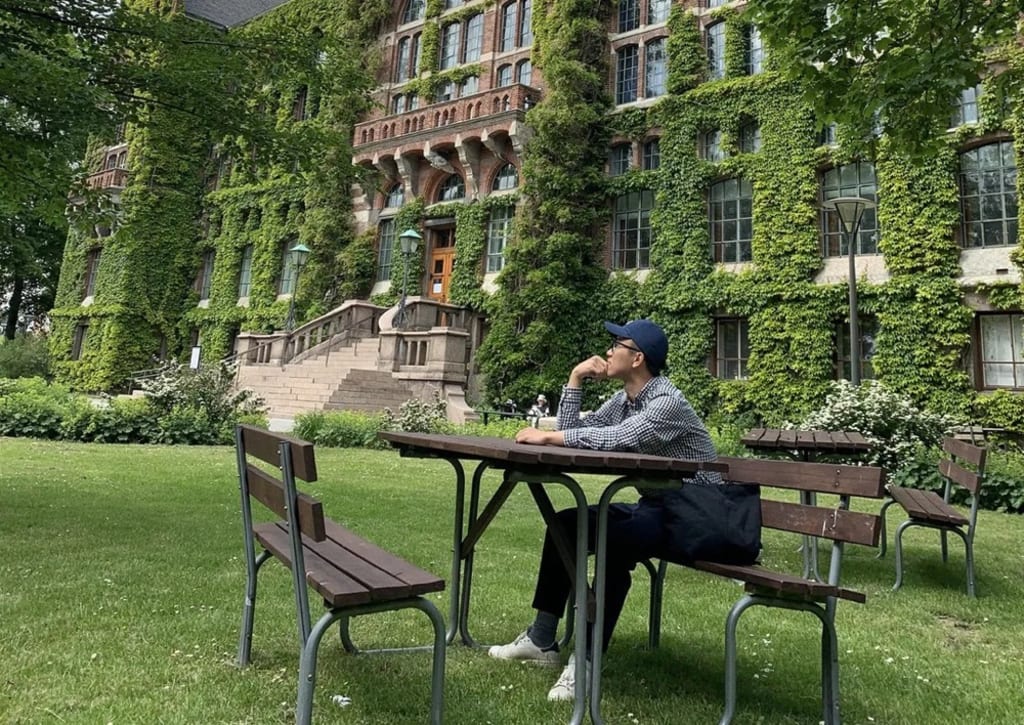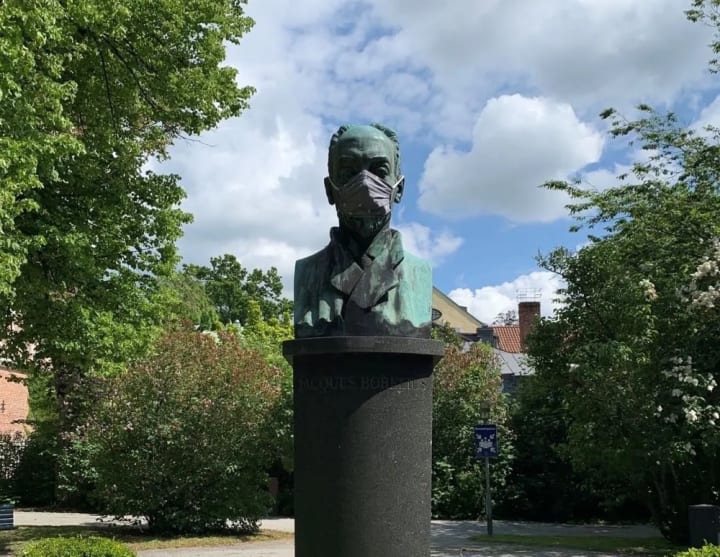Fighting the epidemic abroad: feeling the warmth from the motherland in Sweden
University of Law students experience overseas fight against epidemic

Before writing
"I was fortunate enough to receive a scholarship from the university for a semester-long exchange program at Lund University in Sweden from January to June 2020. But unexpectedly, the epidemic that swept through the world shattered the original plans and expectations, and the fight against the epidemic abroad became the keyword of my study career.
Arriving at the coldest time and leaving on the warmest day, I experienced the winter and summer in Sweden, and although it was only a short 6 months, it gave me some insight into the culture of the Nordic countries that were at the brink of the epidemic. Being in a foreign country also made me more able to witness the strength of my country and feel its thoughts across the ocean, which was a special gift brought to me by the epidemic.
From January to June 2020, he was awarded the "Double First Class" scholarship to study at Lund University, Sweden.
Lagom: not too much, not too little
Lund University is located in warm and humid Skåne in southern Sweden, across the fjord from Copenhagen, the capital of Denmark. Even though Sweden and Denmark are both Nordic countries, with free passage via the Øresund Bridge, they have shown two very different ways of dealing with each other in a battle without smoke and mirrors. After the outbreak in Europe, Denmark took the lead in closing its borders and shutting down stores and schools, while Sweden did not take any city closures or bans, but used a "herd immunity" approach to fight the virus.
I once saw a saying on the Internet that Scandinavians are born with loneliness, and I know it very well after visiting Sweden. Even on a winter day when the cold rain stings the spine, people are reluctant to huddle under the awnings at bus stops to escape the rain, and there seems to be a natural social distance between strangers. You wouldn't expect the person standing two or three meters away from the stop to be waiting for a bus if they didn't all move under the stop sign and form a line when the bus arrived. A Swedish classmate told me that Swedes are not aloof, but rather have respect for private space in their friendliness. This perception seems to have made the advocacy of keeping social distance during the epidemic very effective. The IKEA ad during the epidemic showed elderly Swedes sitting in front of their homes drinking coffee with their neighbors across the street.
Along with the natural sense of boundaries is the Swedish approach to life, with "Lagom" being adopted by modern Swedes as a spiritual code of living. The word is interpreted as "not too much, not too little", which means that the Swedes pursue a moderate lifestyle, without having to be at the top, but also without doing anything. The Swedes do not love to work, but they divide work and life very clearly, using a fixed amount of time to complete work efficiently, and then spend more time focusing on enjoying life. Scandinavian minimalism is not absolute subtraction, not strictly black and white, but just right and feel comfortable, they are "almost Mr.". So this may explain why the Swedish government has not taken a hard-line blockade, but only initiated self-segregation, and closed only the universities, not the kindergartens.

Our meeting is only meaningful if you want to see me
The year 2020 is destined to be an extraordinary year for overseas students. Due to the epidemic, Lund University has also implemented all online classes since March 18th. After completing the last class of the first phase of the course, I was "quarantined" at home. The class seemed to be an early rehearsal for the end-of-course celebration, but the atmosphere was a bit heavy. More than half of the class chose to go home early because of the epidemic, and many of them even made the decision a day early. The goodbyes came so suddenly that before champagne and flowers could be prepared, they said goodbye to each other with physical contact limited to elbow strikes. Some students were already on their way home, while others were stuck in a country they couldn't leave because they were visiting family or traveling. It was also my last day of classes in the Lund building, and everything seemed to come to a screeching halt. What moved me the most was a comment made by an Italian professor.
Shortly before that, an epidemic broke out in Italy, followed by the closure of the city and the country, while the professor's parents were still in Italy. In the past, we could meet at any time, but now it was a luxury. The professor said that she was worried about her mother in Italy, but there was nothing she could do about it, and her eyes even shone with tears when she was moved. The professor was also concerned about where I was going and asked if I would choose to return to my country. Faced with the negative attitude of Europe in fighting the epidemic, she said, "Only the Chinese and the Italians know the seriousness of the epidemic, and China has assisted us, only we can empathize with each other, we are in this together. If you have any difficulties please feel free to contact me."
After leaving the classroom, I went to the supermarket to buy more food and daily necessities, but of course toilet paper had been out of stock for several days. I was also well prepared because I knew what was going on in the country to fight the epidemic; after all, the next time I came downtown, it was time to return my books to the library before leaving Lund. Recently, the grass has been growing, and as my roommate so eloquently summarized, it rained every day in Lund before the school closed, and there have been only a handful of sunny days since the school started, whereas almost every day has been sunny since the quarantine started. But the days must go on. So, in order not to waste the great spring light, we set up a dining table on the balcony of our apartment to start our segregated life in the company of each other and the sun.
My apartment building was the university's international student apartment, inhabited by students from different countries, with Swedes in the minority. Most of us lived in shared apartments and shared a kitchen. Although the building was mostly empty during the outbreak, luckily most of my roommates chose to stay and follow the 14-day quarantine recommendation, and I had the unique experience of spending more time with them as a result. Only my Canadian roommate was forced to interrupt her trip to Finland and return home early. Her last memory is still of her taking a ferry back to Sweden after experiencing multiple flight cancellations and an exhausting overnight train ride back to Lund.

The other roommates were from India, Australia, Spain, and France, and they had both the cultural symbols and distinct personalities of the countries they belonged to. During the quarantine period, we had little interaction with outside people, except for shopping trips. Regular cleaning and hand washing with hot water and hand sanitizer ensured maximum safety in the group quarters, and it was interesting to note that everyone's hands were coincidentally red with burns. To spice up our boring lives, we decorated the common space, added sofas, and grew garlic on the balcony. We inspired each other during the days of isolation, shared the food of our respective countries, spent movie-sharing night after movie-sharing night together, and our hearts gradually mingled with each other. We also went on small outings while ensuring safety. As Sweden is a sparsely populated country with forests covering nearly two-thirds of its territory, hiking and trekking became our main outdoor activities.
The epidemic made everyone's life slower and simpler, and I was able to see the real attitude of people in different countries towards the epidemic from being in Europe, which was full of harsh voices, but more compassionate and hand in hand. The International Student Residence is a microcosm of the global response to the epidemic, where everyone has a different attitude towards the epidemic, yet they understand and cooperate.
Although the school has switched to online classes due to the epidemic, the classes and webinars are still available, except for face-to-face communication. The course I attended happened to be for international students, and many of the students who were supposed to be in the same classroom had returned to their home countries, so except for the local students who stayed in Sweden, we all overcame the time difference and attended the same class in all corners of the world, but our communication and discussions were not affected by this. It was as if the conversation had opened up at this point, and the enthusiasm of the discussion was not doused.
There were fears and worries, especially when my phone was flooded with information about sky-high airfares and "regular" calls from family and friends back home, which made me feel anxious. Nevertheless, the encouragement of my family and friends and the company of my roommates made my heart more and more stable. I finished my dissertation, watched all the movies I had wanted to watch but didn't have time to do so, exercised for half an hour every day, and learned to please myself with frozen food and dried milk. The epidemic made the pace of life slow, but watching the trees outside my window slowly sprout and stretch every day, from bare to lush, it was as if I was growing with it.
Hearing about you from afar, I set out to travel thousands of miles
The masks went off the market around the Chinese New Year, and I could barely buy 10 masks after going to all the pharmacies in Lund. Once I started quarantining, I tried to go out less often and used the masks repeatedly. However, the anxiety of not being able to return home and the fear of not being able to buy masks spread among the international student community, and some people took the opportunity to peddle overpriced masks.
On March 20, I received the masks distributed by the Chinese Consulate General in Sweden in cooperation with the Academic Union. On April 13, the health kits from the Chinese Embassy in Sweden arrived as scheduled and were distributed to everyone through the student union and dormitory volunteers. The moment I received the health kit was as exciting as receiving a prize. Only China has such strength and national cohesion to care about every overseas student and do its best to help them. While my roommates were still struggling to buy masks, I already had enough food. To reduce the risk of mutual infection, I also shared the gift of my country with my roommates, handing them a mask when they went shopping and proudly saying that it was care from the embassy of my country. "Hearing that you are far away, moving to trek thousands of miles", the health kit carries the care of my family from my homeland, and even if they are thousands of miles apart, blood and kinship will never be broken. Never forget where you started because you have gone too far. No matter when and where you are, you will never forget that you are a son or daughter of China and a descendant of Yanhuang.
I started to miss her, from the moment I got a ticket back to China. The safety of international students during the epidemic and the necessity of returning to China were also hot topics of discussion. I was often worried and hesitated because of this, but in the end, I chose to stay and finish my studies. Looking back now, I still don't regret my choice because the company of my roommates, the encouragement of my relatives, and the concern for my country made me feel more comfortable. I was even more fortunate than those who could not return home on time or in the harsh environment around me. In May, after the June flight schedule came out, I was able to get a ticket from Stockholm to my home country, the day before my visa expired, which was so lucky.
At this point, I began to think back on my time in Sweden, from the excitement and newness when I first arrived, to the worry I felt for my family when the epidemic broke out in China, to the epidemic spreading to Europe causing school closures and empty cities, and myself being in a difficult situation, and then completing a special exchange trip with the care and companionship of my country and my teachers and friends. The moment I landed safely in Tianjin, I felt more at ease than ever before, and I have never felt such a strong sense of nepotism. The moment the quarantine officers came on board fully armed for inspection, I knew I was home and I burst into tears.
The day I left Sweden coincided with the annual Midsummer Festival, the warmest day of the year, and the , climax of summer. I took the five-hour train ride from Lund to Stockholm, my departure point, crossing meadows, forests, and lakes, witnessing the usual and slightly forlorn festive atmosphere of the Nordic capital, and repeatedly recalling those days when I crossed from wintertime to daylight saving time to say goodbye to her.
About the Creator
Bettye Lutz
Ascent must be inferior, self-esteem is too high can not achieve success, and therefore successful people must cultivate a calm mind, and focus on everything, which is the key to success. I like vocal music






Comments
There are no comments for this story
Be the first to respond and start the conversation.